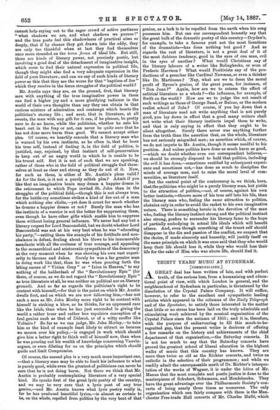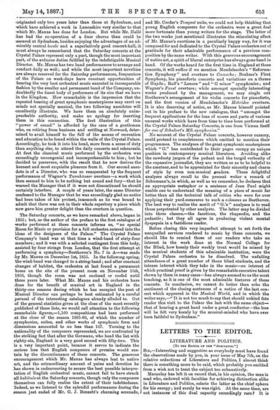A GREAT deal has been written of late, and with perfect
truth, of the serious loss, from a humanising and educa- tional point of view, with which London in general, and the neighbourhood of Sydenham in particular, is threatened by the dissolution of the Crystal Palace Company. It will suffice, however, to refer to the excellent and sympathetic leading articles which appeared in the columns of the Daily Telegraph and of the Spectator, to satisfy those interested in the matter that little or no stress has been laid on the truly admirable and stimulating work achieved by the musical organisation of the Crystal Palace since the autumn of 1855; and it is, therefore, with the purpose of endeavouring to fill this much-to-be- regretted gap, that the present writer is desirous of offering a few remarks on the history and achievements of the chief department of that organisation,—the Saturday concerts. It is not too much to say that the Saturday concerts have proved the greatest school of liberal education in the highest walks of music that this country has known. They are more than twice as old as the Richter concerts, and twice as catholic in the selection of their programmes ; and while we readily admit the unsurpassable merit of Dr. Richter's interpre- tation of the works of Wagner, it is under the bction of Mr. Manna that the most complete and poetic justice is done to the masterpieces of Schubert, Schumann, and Mendelssohn. They have the great advantage over the Philharmonic Society's con- certs of being nearly three times as numerous. The only organisation which can fairly compare with them is the Man- cheater Free-trade Hall concerts of Mr. Charles HalM, which
originated only two years later than those at Sydenham, and which have achieved a work in Lancashire very similar to that 'which Mr. Manus has done for London. But while Mr. Ha116 les had the co-operation of a finer chorus than could be secured at Sydenham, besides enjoying the advantages of an ad- mirably central locale and a superlatively good concert-hall, it must always be remembered. that the Saturday concerts at the Crystal Palace represent only a part, though the most important part, of the arduous duties fulfilled by the indefatigable Musical Director. Mr. Manna has two band performances to arrange and conduct daily as well ; and while the most important novelties are always reserved for the Saturday performances, frequenters of the Palace on week-days have constant opportunities of hearing the very best orchestral music executed in incomparable fashion by the smaller and permanent band of the Company, un- doubtedly the finest body of performers of its size that we have in the Kingdom. How remarkable is the impression that the repeated hearing of great symphonic masterpieces may exert on minds not specially musical, the two following anecdotes will 'excellently illustrate. We have them on absolutely unim- peachable authority, and make no apology for inserting them in this connection. The first illustration of this "power of sound" is afforded by the case of a gentleman who, on retiring from business and settling at Norwood, deter- mined to avail himself to the full of the means of recreation and education to be found within the walls of the Crystal Palace. Accordingly, he took it into his head, more from a sense of duty than anything else, to attend the daily concerts and rehearsals. At first the classical music performed by the orchestra was exceedingly uncongenial and incomprehensible to him ; but he decided to persevere, with the result that he now derives the keenest and most exquisite pleasure from it. Our second anec- dote is of a Director, who was so exasperated by the frequent performance of Wagner's Tannhauser overture—a work which then seemed to him to be nothing but sound and fury—that he warned the Manager that if it were not discontinued he should certainly interfere. A couple of years later, the same Director confessed. to the Manager that he was exceedingly glad no notice had been taken of his protest, inasmuch as he was bound to admit that there was not in their whole repertory a piece which now gave him greater delight than the overture in question.
The Saturday concerts, as we have remarked above, began in 1855; but, as the author of the preface to the first catalogue of works performed at these concerts informs us, "no special Room for Music or provision for a fall orchestra entered into the ideas of the designers of the Palace." The Crystal Palace Company's band was at that time a wind-band of sixty-four members ; and it was with a selected contingent from this body, assisted by four strings from London, that the first attempt at performing a symphony—Beethoven's No. 7 in A—was made by Mr. Manns on December 1st, 1855. In the following spring, the wind-band was changed to a string-band; and after constant changes of habitat, the orchestra at last found a permanent home on the site of the present room on November 15th, 1856, though the room was not enclosed or roofed until three years later. What Mr. Manna and his orchestra have done for the benefit of musical art in England in the thirty-one seasons during which he has occupied the post of Musical Director can perhaps be best estimated by a careful perusal of the interesting catalogues already alluded to. Out of the general statistics given at the close of the most recently ,published of these lists, we would call attention to the following remarkable figures,-1,160 compositions had been performed at the close of the season 1885-86, of which the number of .symphonies, finites, and other works of symphonic form and dimensions amounted to no less than 167. Turning to the nationality of the composers represented, we are confronted by the striking fact that after the Germans, who head the list with eighty-six, England is a very good second with fifty-two. This is a very important point, because it serves to indicate the .serious loss that English composers of promise would sus- tain by the discontinuance of these concerts. The generous encouragement which Mr. Manna has always lent to native art, and the extraordinary amount of pains and devotion he ]gas shown in endeavouring to secure the best possible interpre- tation of English orchestral music, cannot fail to have struck all habitues at the Saturday concerts, though only the composers themselves can fully realise the extent of their indebtedness. Indeed, as we listened to the splendid performances during the mason just ended of Mr. G. J. Bennett's charming serenade,
and Mr. Corder's Tempest suite, we could not help thinking that young English composers for the orchestra were a great deal more fortunate than young writers for the stage. The latter of the two works just mentioned illustrates the stimulating effect of Mr. Manna's exertions in a peculiarly happy way, for it was composed for and dedicated to the Crystal Palace orchestra out of gratitude for their admirable performance of a previous com- position by the same writer. With this generous encouragement of native art, a spirit of liberal enterprise has always gone hand in hand. Of the works heard for the first time in England at these concerts, it will suffice if we mention Mendelsaohn's "Reforma- tion Symphony" and overture to Camacho ; Brahma's First Symphony, his pianoforte concerto and variations on a theme of Haydn; Raft's " Lenore " and " G minor " symphonies ; and Wagner's _Faust overture ; while amongst specially interesting works produced by the management, we may single out Beethoven's arrangement of his violin concerto for pianoforte, and the first version of Mendelesohn'a Hebrides overture. It is also deserving of notice, as Mr. Mantis himself pointed out in his preface to the new catalogue, that "amongst the frequent applications for the loan of scores and parts of various unusual works which have from time to time been performed at the Crystal Palace Saturday Concerts, is one from Vienna itself for one of Schubert's MS. symphonies."
No account of the Crystal Palace concerts, however cursory, could pretend to completeness which omitted to mention their programmes. The analyses of the great symphonic masterpieces which " G." has contributed to their pages occupy an unique position in contemporary musical literature. Avoiding alike the sawdusty jargon of the pedant and the turgid verbosity of the expansive journalist, they are written so as to be helpful to the amateur, and to be appreciated for their sincerity and charm of style by even non-musical leaders. These delightful analyses always recall to the present writer a remark of Schumann's, in which, as well as we remember, he declares that an appropriate metaphor or a sentence of Jean Paul might enable one to understand the meaning of a piece of music far better than all the technical talk of critics who were for ever applying their yard-measures to such a colossus as Beethoven. The best way to realise the merit of " G.'s " analyses is to read. those perpetrated by other analysts. The latter may be divided into three classes.—the facetious, the rhapsodic, and the pedantic ; but they all agree in producing violent mental dyspepsia in a fastidious reader.
Before closing this very imperfect attempt to set forth the unequalled services rendered to music by these concerts, we should like to remind those of our readers who take an interest in the work done at the Normal College for the Blind, how keenly their weekly treat would be missed by the musical students of this admirable institution, were the Crystal Palace orchestra to be dissolved. The unfailing attendance of a great number of these blind students, and the intense interest which they take in the music—an interest of which practical proof is given by the remarkable executive talent shown by them in many cases—has always seemed to us the most touching, as it is one of the most admirable features of these concerts. In conclusion, we cannot do better than echo the sentiment of the closing sentences of a notice of the last con- cert which appeared in the Musical World, and in which the writer says,—" It is not too mach to say that should unkind fate render this visit to the Palace the last with the same object—. that of hearing a great band under a great conductor—the loss will be felt very keenly by the musical-minded who have ever been faithful to Sydenham."



































 Previous page
Previous page